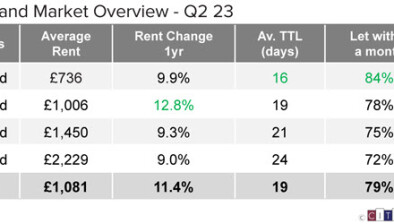£4,000 payment order made against landlord in breach of tenancy deposit rules decreased on appeal

A landlord who was ordered to pay £4,000 to two former tenants after being found in breach of tenancy deposit regulations has had the sum reduced by £1,500 on appeal to the Upper Tribunal for Scotland.
Gordon Bavaird, a landlord since 2017, had originally taken a deposit from tenants Lisa and David Simpson of £2,000, which was never paid into an approved scheme per the Tenancy Deposit Schemes (Scotland) Regulations 2011. On appeal, he argued that the amount of the sanction was excessive and was not appropriate in the circumstances.
The appeal was heard by Sheriff George Jamieson of the Upper Tribunal. The appellant made his own submissions, with Ms Simpson making submissions on behalf of both respondents.
Not a rogue landlord
The parties entered into a private residential tenancy in respect of a property in Strathaven with a start date of 1 November 2021. The deposit of £2,000 was paid into the appellant’s own account, but never into an approved scheme. At the end of the tenancy on 1 April 2022, the deposit was repaid to the respondents with no deductions made.
At a case management discussion in which all parties participated, the First-tier Tribunal considered that an award of twice the amount of the deposit was appropriate on the basis that there were limited mitigating circumstances. The Tribunal considered that it appeared that the failure to place the deposit into an approved scheme was deliberate, the appellant having no system in place to account for tenancy deposits.
It was accepted by the appellant that he was unaware of the deposit scheme, even though he had been renting properties since 2017. However, he submitted the scheme had been put in place to punish “rogue landlords”, which he was not, and the amount of the sanction as assessed by the FTS was excessive. Since the making of the application to the FTS he had fully complied with the 2011 Regulations.
For the respondents it was submitted that the appellant’s failure to comply with the Regulations had been a persistent one as the appellant had not paid previous’ tenants’ deposits into the scheme and that the FTS had been correct to take a serious view of the appellant’s non-compliance with the Regulations. The amount of the sanction reflected the fact that the deposit was unprotected for the entirety of the tenancy.
No loss or inconvenience
In his decision, Sheriff Jamieson observed: “In this case, the appellant submitted that although he had not been aware of the Regulations at the time, he had made his own arrangements to protect tenants’ deposits; and, indeed, as in this case, the tenants’ deposit was repaid immediately after termination of the tenancy. This had been quicker than a repayment from an approved scheme which took up to 10 days. I presume he has acquired this knowledge since becoming compliant with the tenancy deposit scheme.”
He continued: “However, this is not a relevant factor to take into account: it is no excuse for the appellant’s failure to comply with the Regulations and cannot therefore be considered as a mitigating factor by either the FTS or the UTS.”
On whether the appellant had deliberately chosen not to participate in the scheme, he said: “The appellant did not accept this as a fair or correct conclusion in his submissions to the UTS and I accept his evidence to the UTS that his actions were not deliberate. Nor was he pushed into paying the deposit into an approved scheme by the respondents, given he did not pay the deposit into an approved scheme but instead took immediate action to return the respondents’ deposit to the respondents after termination of the tenancy.”
He concluded: “Significant weight ought to be attached to the appellant’s ignorance of the scheme over the prolonged period of five years as a landlord. On the other hand, significant weight falls to be attached to the mitigating factors that the respondents’ deposit was repaid in full immediately after the termination of the tenancy and that the respondents suffered no loss or inconvenience as a consequence of the appellant’s failure to comply with the Regulations.”
Accordingly, the sheriff quashed the decision of the First-tier Tribunal and instead assessed a fair and proportionate sanction would be £2,500.










